GZERO Europe
Ukraine is still standing two years after Russian invasion

Ukraine is still standing two years after Russian invasion | Europe In :60

From Kyiv, Ukraine, Carl Bildt, former prime minister of Sweden and co-chair of the European Council on Foreign Relations, shares his perspective on the second anniversary of the Russian invasion of Ukraine.
Europe in 60 Seconds. This is Carl Bildt in Kyiv, Ukraine. At this time, there's only one question here. This is two years after Mr. Putin unleashed the entire might, military might of Russia against Ukraine, trying to get rid of Mr. Zelensky, effectively get rid of Ukraine. He failed. Ukraine is still standing. Life in Kyiv goes on. But, of course, there's a horrible, brutal attrition war going on in the east and the south part of the country.
And the question is, what will happen?
Resources are being thrown in. Western support is absolutely essential for Ukraine. They are fighting and they are determined that they're going to win this fight. But they are also very much dependent upon the support by the Europeans and by the Americans. And to give that support from the European point of view, it’s essential for our future security. And from the wider point of view globally, in order to send a clear message to others who might be contemplating military expeditions elsewhere in the world, it’s bound to fail.
Chris, an Army veteran, started his Walmart journey over 25 years ago as an hourly associate. Today, he manages a Distribution Center and serves as a mentor, helping others navigate their own paths to success. At Walmart, associates have the opportunity to take advantage of the pathways, perks, and pay that come with the job — with or without a college degree. In fact, more than 75% of Walmart management started as hourly associates. Learn more about how over 130,000 associates were promoted into roles of greater responsibility and higher pay in FY25.
Putin can't stop won't stop. #PUPPETREGIME
In this Quick Take, Ian Bremmer weighs in on the politicization of the Olympics after comments by Team USA freestyle skier Hunter Hess sparked backlash about patriotism and national representation.